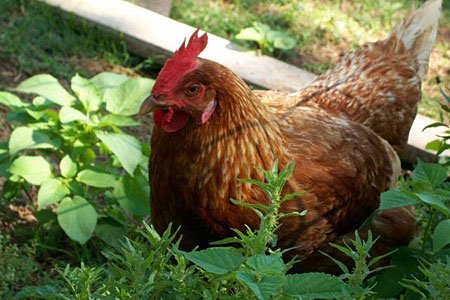
What you can do when a egg layer stops laying depends on the reason she stopped. A hen may take a break for a great number of reasons. Once you determine the reason, you may be able to take measures to get her back on track. So let’s look at possible reasons why your egg layer stops laying and what you can do about each.
Too Hot
As summer temperatures start reaching the 80s and beyond, chickens begin to feel heat stress. To cool their bodies, they use up energy that would otherwise go into egg production. During an extended period of hot weather, a heat stressed hen may simply quit laying.
What to do: Provide plenty of clean, cool drinking water. Make sure the hens have shade, especially where they can enjoy a breeze or at least air circulation from a fan.
Fall Molt
Toward the end of summer, chickens grow a fresh set of feathers to better keep them warm during winter. During this molt, all hens experience reduced laying, and some stop laying altogether.
What to do: Growing feathers requires extra protein. Your molting flock therefore would appreciate a supplemental animal protein treat, such as meal worms.
Short Days
The approach of winter means day length starts decreasing. When the number of daylight hours falls below 14, hens typically stop laying until spring.
What to do: To keep eggs coming all winter, augment daylight hours by using a 40-watt or equivalent light bulb per 100 square feet of coop space. An automatic timer is handy for maintaining consistent hours of light and dark.
Improper Diet
Hens that have a nutritionally imbalanced diet have trouble both maintaining bodily health and laying eggs. Poor nutrition may result from feeding stale ration, the wrong ration, or too many treats, such as scratch grain.
What to do: As pullets reach the age of lay, gradually switch their diet from starter or grower ration to a regular layer ration formulated to ensure good egg production. Provide a separate source of oyster shell or other calcium supplement, available at all times. And go easy on the treats.
Insufficient Water
Lack of drinking water for even a short period can cause egg layers to stop laying. In hot weather, laying hens drink up to four times more than usual, and will become dehydrated if their water supply runs out. In winter, dehydration can occur if the drinking water freezes.
What to do: Encourage hens to drink more during hot weather by offering plenty of cool drinking water. If necessary, add more drinkers or fill them more often. In cold weather, offer warm drinking water.
Parasite Infestation
Layers that are bothered by internal parasites (worms) or external parasites (lice or mites) may slow down or stop laying.
What to do: Regularly check your chickens for worms, lice, and mites. If necessary, treat to reduce the parasite load.
Broody Hen
When a hen starts to brood, hormonal changes cause her to stop laying. A broody hen therefore is not much use for egg production.
What to do: To discourage broodiness, don’t let eggs accumulate in the nest. If a hen begins to brood anyway, repeatedly remove her from the nest. If she keeps returning, move her for a few days to different housing, such as a rabbit cage. But, of course, keep providing feed and water during that time.
Aging Hen
As a hen ages, she lays fewer eggs each year until eventually she may stop laying. Most hens lay really well for only two or three years.
What to do: In this situation, the only thing you can do is to periodically acquire new pullets. Some chicken keepers cull their older hens when bringing in replacement pullets. Others just keep adding to the flock. Which way you go is something to think about before it’s time to make the decision.
And that’s today’s news from the Cackle Coop.
Gail Damerow, author, Storey’s Guide to Raising Chickens.


What to do if hens lay soft eggs?